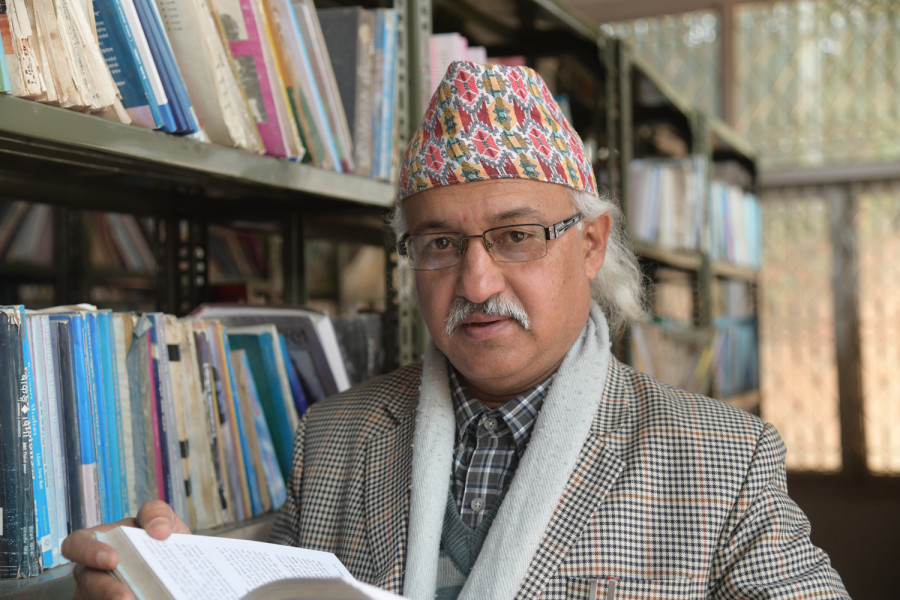Books
'Identify yourself and your interests, then practice—a lot'
Shailendu Prakash Nepal talks about writing, his favourite books and the new wave of Nepali grammar.
Dipesh Khatiwada
Litterateur Dr Shailendu Prakash Nepal’s works in Nepali youth literature is loved and respected by many. Over the years, he has published numerous books and poetry collections—Namita Sunita (Khandakavya), Diana (Mahakavya), and Kamana (novel), to name a few. And his recent work, Junlai Chumne Ichha, is another wonderful addition to his body of work, one that stimulates a child’s imagination and provides an important visual experience through poetry.
Besides his fiction writing, Nepal’s books on grammar have also been appreciated by many in academia, due to their clarity and ease of reading. In an interview with the Post’s Dipesh Khatiwada, Nepal talks about his love for literature and shares five books he thinks everyone must read. Excerpts:
When did you start reading religiously?
Books are one of the best sources of knowledge and information. Over the years I have found that good books are the best tools to increase one’s awareness. I developed my passion for reading when I was in college, immersing myself in different genres, reading everything I could. But I must say I have a deep inclination towards reading biographies, as such books have a great impact on one’s mind.
What was the last book you read and did you like it?
The last book I read was Usha Thapaliya’s Naari Timi Hareki Chhainau, which is based on the plight of the Nepali women in the present context. The book talks about the suffering and hardship of women in Nepali society, their situation and also about the responsibility of the nation to empower its women. This book is a collection of articles and opinions published by the author in various media outlets. The book also depicts the struggle of the author herself, and I am a big fan of her work.
What are the five books you’ve read that you would recommend as must-reads?
I believe that the first and foremost book that everyone should read is Bhanu Bhakta Acharya’s Ramayan. I would read this book over and over again because it restructures the reader’s mind every time they read it. I also enjoyed reading Naso, a collection of short stories, by Guru Prasad Mainali. Laxmi Prasad Devkota’s epic Muna Madan, which is written in Nepali loklaya, is a gem for Nepali literature. I also enjoyed reading Jagadish Ghimire’s Antarmanko Yatra, an autobiography. And Jhamak Ghimire is another writer that I am very fond of. I enjoyed reading Ghimire’s Jeewan Kanda Ki Phul.
Which books are currently on your wishlist?
I am looking forward to reading Yogmaya, a novel written by Neelam Karki Niharika, which received the Madan Puraskar Award last year. This book depicts the struggle of the title character Yogmaya, who received Yog Sadhana (discipline of routine spiritual practice) during the Rana regime. I am going to invest my time to know how the writer incorporated the character in her novel. Hopefully, I will read this book this year.
As a Nepali grammar textbook writer, how do you view the current new wave that’s shaping the language?
The current wave of Nepali grammar is following the middle path, which we called Madhya Marga. It is not like our traditional grammar, nor like what scholars had predicted it to be around one and a half to two years ago. As language changes with time, so does its grammar. The language we write and speak now is not similar to what people used to speak during the time of Bhanu Bhakta Acharya’s and Motiram Bhatta. That’s why we have tried to make it easier by adopting the middle path.
What book has influenced you the most and why?
The most influential book that I have read has to be Anne Frank’s diary, the translated version by Geeta Upadhyaya in Nepali. The diary has been published in more than 150 languages, including Nepali. After reading this book, I also wrote a diary for one year. As a writer, I think this is the book that every youth should read once.
How do you draw inspiration for writing?
My father was a litterateur and he was my source of inspiration for writing. I like to believe his passion was passed on to me. When I was in grade 8, I had started to write poems. While I was with my father in Pokhara during secondary school level, I got a chance to grow up with bookworms around me. During those days, Pokhara’s natural beauty also inspired me to write literature.
What is the situation of Nepali literature right now?
These days, literature has grown commercially due to the advancement of technology and media reach. Every year, hundreds of books are being printed on different genres. Publishers and writers organise book launches and publicise their books in a grand way. But I am not sure if I like this approach. Good literature doesn’t need any publicity. For example, books of Laxmi Prasad Devkota, Bhanu Bhakta Acharya, Lekhnath Poudyal, among others, are popular without any publicity. A book needs to be rich in knowledge and new information to be effective and widely popular in the market.
What are your suggestions to those who want to write literary books?
In Nepal, very few people have a habit of reading. For those who want to write literature, I have nothing much to say, but this: Read books if you want to be open-minded. Then identify yourself and your interests, then practice—a lot.




 27.41°C Kathmandu
27.41°C Kathmandu










